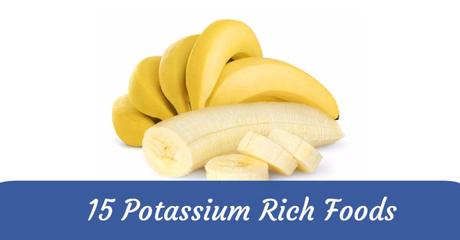
Potassium is an important compound present in the body; it interacts with minerals, like sodium, to offer other important daily functions. It works effectively to increasing balancing fluids and also stabilizes mineral levels in the body.
There are several other functions that potassium helps for individuals who want to build muscle. It helps to integrate cellular functions, such as regulating heartbeats and nerve impulses, contraction of muscles, relief from muscle ache, enhanced digestive system, and also increased energy levels.
Individuals that lack potassium in their bodies are known to show several adverse health-related symptoms, including:
- Sensitivity to salt or sodium
- Kidney stones
- Rise in blood pressure
- Frequent fatigue
- Trouble getting good sleep
- Weak muscles and spasms
- Higher risk of heart disease
- Insulin resistance and prone to diabetes
Lack of potassium content in the body makes it difficult to maintain pH levels in the body. The body becomes more acidic, as it fails to neutralize acids. Acids generated in the body during digestion and metabolism of proteins accumulate in the body, which is harmful.
However, one of the best ways to consume potassium and other minerals is the foods we eat. So, in order to avoid scarcity of any kind of nutrients in the body, you can always choose the food that can help you to balance it.
Likewise, there are several foods that you can eat to overcome a lack of potassium in the body. Also, as this is a natural way, you are not only able to get potassium but you also consume other necessary nutrients.
Here are the foods that you can consume:
1. White beans
Considerably the best source of potassium available, one serving or one cup of white beans forms almost one-fourth of the total potassium that our bodies need every day.
Along with being a good source of potassium, white beans are also very high in fiber, which offers added benefits. Fiber-rich foods are known to decrease heart diseases and lower the risk of diabetes. It also helps you to gain a healthy waistline.
One cup white beans = 1189mg potassium2. Lima beans
Being a mineral-rich food, Lima beans are also known to be an excellent source of potassium. The potassium content in Lima beans is comparatively higher than other beans, such as red kidney beans, broad beans, and black beans.
Lima beans also include other minerals, like molybdenum, iron, copper, manganese, calcium, and magnesium. Lima beans are also known to contain dietary fibers that reduce blood cholesterol levels.
One cup Lima beans = 950mg potassium3. Avocado
As far as potassium-rich foods are concerned, that avocado has to be on the top of the list. One whole avocado can provide you with at least 30% of the daily required value of potassium.
Studies also suggest that eating avocados helps to reduce the factors of metabolic diseases. Also, individuals who add avocado to their diets are found to be healthier and have enhanced nutrient intake.
One whole avocado = 1067mg potassium4. Broccoli
Even broccoli is on our list of best food sources of potassium, as it can provide you with almost 9% of the daily required value. Apart from this, there are several other health-related benefits that broccoli provides. It is also an extensive source of fiber and protein in the form of plant protein.
The health-related properties of broccoli also make it a great food for weight loss.
One cup broccoli = 458mg potassium5. Sweet potato
It is important to add sweet potatoes to your diet, as they are known to be an impressive source of potassium and other nutrients.
Both white potatoes and sweet potatoes are considered the best sources of potassium, but sweet potatoes provide you with other benefits, too. They are also known as a source of fiber content and contain beta-carotene.
One medium sweet potato = 438mg potassium6. Bananas
The banana has to be your go-to fruit when you are looking to recover potassium content in your body.
It’s a well-known fact that bananas are very high in potassium, and there are only a few foods that can match the potassium content of a banana. One medium-sized banana can provide you with almost 12% of the daily required value of potassium. This definitely allows you to fulfill the needs of your body.
Along with potassium, the banana also contains vitamin B-6, vitamin C, and magnesium. It is also considered to be a superfood.
One medium banana = 422mg of potassium7. Salmon
Salmon is one of the heart-healthy fish that contain an adequate amount of potassium. You can purchase salmon in canned packaging, of which a three-ounce serving is known to have 292mg of potassium and around 17g of protein.
Apart from this, if you purchase sockeye salmon, also known as red salmon, it contains around 347mg of potassium and 22g of protein. There are other varieties of salmon available as well, such as Atlantic farmed salmon and wild Atlantic salmon, which have 326mg and 534mg of potassium, respectively.
As there is a variety of salmon recipes available, it can easily be added as a diet food for potassium. Its protein content adds to the benefits of eating salmon.
A three-ounce serving of salmon = 416mgpotassium8. Peas
Peas are legumes that are a recommended food for various nutritional benefits. They are not only low in fat, but they provide you with vitamin B, folate, iron, magnesium, fiber, protein, and phytochemicals that prevent any kind of heart disorders.
The most important element peas contain is a considerable amount of potassium. You can easily add them to soup and salads or prepare a dip and add them to your diet for potassium recovery.
One cup peas = 384mg potassium9. Watermelon
Watermelon is definitely the best choice of fruit, especially during the summer. Along with containing a significant amount of water and fiber, it is also known to contain an adequate amount of potassium.
By eating two watermelon wedges, you can obtain almost 15% of the daily required value of potassium. Also, it is an impressive source of lycopene, which is found to reduce a certain type of cancers.
One watermelon wedge = 321mg potassium10. Grapefruit
Largely popular for its sweet, tart, and tangy taste, grapefruit is a popular citrus fruit. While the vitamins A and C content and low-caloric value make it a good addition to your diet, its potassium content makes grapefruit more essential.
Grapefruit is known to provide you with almost 7% of the daily required value of potassium. If you eat half of a large grapefruit, you are likely to consume 231mg of potassium.
One whole medium-sized grapefruit = 354mg potassium11. Dried apricots
Dried apricots are a very good source of potassium. Dried apricots are known to contain three times more potassium than a banana. The potassium in apricots has more water-retaining abilities than sodium; thus, they lower blood pressure. Apricots also prevent heart diseases.
Along with that, the potassium content of apricots is also important for bodybuilding functions, like enhanced metabolism and the function of organs and cells. Apricots also help to stabilize the acid content in the body that assists photosynthesis.
One cup dried apricots = 1500mg potassium12. Acorn squash
Often found in winter, acorn squash is also an effective source of potassium. It is found that one cup of cooked acorn squash can provide you with almost 20% of your daily required value. Along with this, it also provides a significant amount of fiber and nutrients, like folate and magnesium.
There are several ways of adding squash to your diet.You can add it to salads, make smoothies, or grill acorn squash and serve it as a side dish.
One cup Acorn squash = 896mg potassium13. Tomato
The tomato itself is a good source of potassium. However, when you choose to consume tomato paste, tomato sauce, or sundried tomatoes, the potassium value increases. While a tomato sauce can provide you with almost 15% of the daily value of potassium, a sundried tomato can provide you up to 40%.
They are also low in fat, contain high amounts of fiber and protein, and are rich in vitamin C.Tomato also has positive effects on your digestive system and immune system. It can easily be added to dishes as toppings, salads, or sandwiches, too.
One cup tomato sauce= 728mg potassium14. Dark,leafy greens
Where potassium content is concerned, dark, leafy greens, like spinach, can be the best sources of it. Spinach contains almost 800mg of potassium per cup when cooked. Bok choy or Chinese cabbage contains 600mg per cup, whereas Swiss chard contains almost 1,000mg of potassium per cup when cooked.
Apart from this, green, leafy vegetables also provide you with a range of nutritional benefits because they are low in calories and contain many vitamins and minerals.You also have the option of buying frozen spinach, which is much cheaper compared to fresh vegetables.
One cup frozen spinach= 540mg potassium16. Milk
People look to vegetables and fruits when they lack potassium. However, dairy products are found to be an equally effective source of potassium that can be added to your diet.
It is important for you to ensure you consume low-fat milk to get better benefits.
One cup of whole milk contains almost 300mg of potassium. If milk is something that you do not like, you can always prepare yogurt, smoothies, or milkshakes. Yogurt can contain around 425mg of potassium on average, which makes it important as a dietary food.
One cup non-fat milk= 382mg potassium
